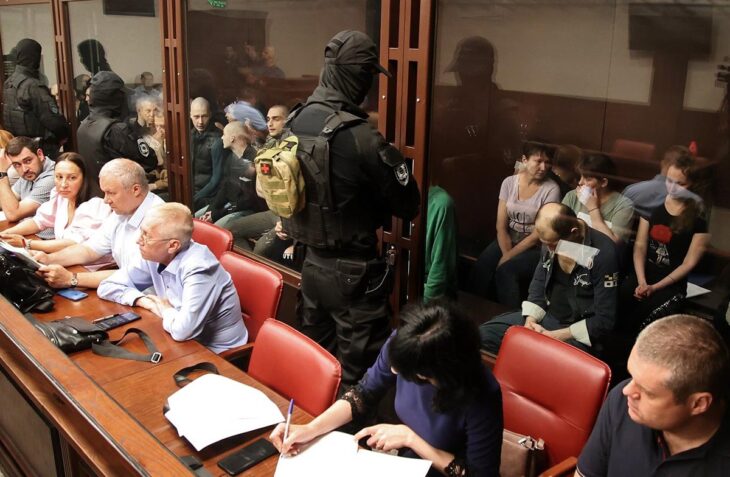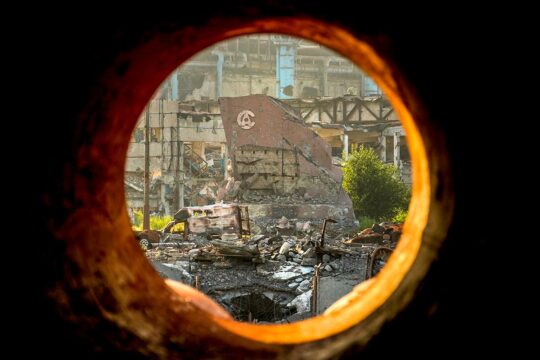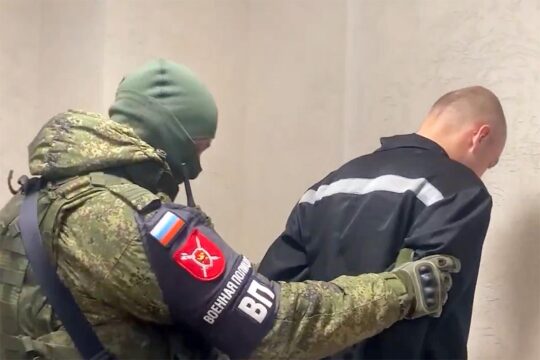On July 19, the first substantive hearing in the case of 22 alleged members of the Ukrainian “Azov” battalion took place before the military court of Rostov-on-Don, located in southwestern Russia on the Don river, 32 kilometers from the Sea of Azov. More than 40 people gathered in the courtroom - lawyers, journalists, bailiffs. Behind the glass of the "aquarium", where defendants sit in Russian courtrooms, 22 accused including nine women were lined up. The unusually large "aquarium" was guarded by five security guards wearing bulletproof vests and black balaclavas. According to the state prosecution's plan, there should have been 24 people in the enclosure, but two of them - lieutenant David Kasatkin and senior officer Dmitry Labinsky - were exchanged last autumn with Russian prisoners of war.
Among the 22 actual defendants, only six of them appeared to be active soldiers when they were captured. Seven stopped military service before the start of the full-scale invasion of Ukraine by Russia on 24 February 2022, according to Ukrainian medias. The nine women worked in the Azov regiment as cooks or performed chores.
The hearing on July 19 began with a delay [Justice Info was able to access information with a combination of media and lawyer sources and an audio recording of the debates]. The prosecutor explained that the delay was due to the health condition of one of the defendants, Alexander Ishchenko. In response to the judge's inquiry, he stated that he was feeling “better already”. “Did the doctors tell you anything?” asked the judge. “They diagnosed a hypertensive crisis and administered an injection. He's feeling fine now,” replied the representative of the prosecution on behalf of the defendant.
The hearing marked the first session after a month-long recess. During this time, the prosecutor aligned the materials of the criminal case with Russian legislation. Previously, the members of the Azov battalion were accused under the criminal code articles of the self-proclaimed Donetsk People's Republic (DPR). They are charged with the “violent seizure of power” in the DPR, as well as participation in a “terrorist” organization.
Voluntary surrender to pro-Russian authorities
At the previous hearing, the prosecutor read out the charges. Now, the defendants were asked about their attitude towards the accusations. Fifteen of them did not admit guilt and briefly stated their position without going into details. One remained silent. Five asked for the right to tell their position later in the trial. Only one agreed with the accusations.
- “I do not fully admit guilt. I did not take any actions to overthrow the constitutional system or seize power,” stated Vladislava Maiboroda. She worked as a cook in the Azov regiment.
- “I have no connection to the seizure of power because I had no authority during my service. I did not have anyone under my command,” said Maiboroda's colleague Liliya Pavriyanidis, who explained that she left her position and surrendered voluntarily.
- "I worked as a cook, and [during the battle] we had a choice: to leave (the position) or stay. I made the decision to leave on my own," clarified cook Nina Bondarenko.
Artem Grebeshkov said he could only admit to having served in the Azov regiment from 2017 to 2021. At that time, it was not considered terrorist (in Russia), he pointed out.
- "On February 22, 2022, I refused to participate in combat actions, and on April 4, 2022, I voluntarily surrendered to the (pro-Russian) authorities,” said Natalya Golfiner.
Another cook, Liliya Rudenko, drew the court's attention to the fact that the accusation stated she had to leave her position. “But I did it voluntarily,” she said. Her colleague Alena Bondarchuk remained silent. "Feeling unwell?" the court wanted to know. “She refuses to communicate. I cannot express her position,” said her appointed lawyer.
Only one person, Oleg Tyshkul, admitted to agreeing with the accusation, but did not provide any details.
Another five defendants said they would express their guilt or innocence later. Some of them asked the court to take into account some specific details from the case materials.
Silent witness
Then the prosecutor presented his action plan to the court for the hearing: he wanted to question four witnesses, examine the written materials of the case, hear the defendants, and proceed to closing arguments — with no objections from the defence.
The prosecutor immediately called a first witness. The woman was presented as the wife of a defendant, Anatoly Gritsyk, and said he was not anymore a member of the Azov battalion when he was arrested in April 2022 at home near Mariupol, in the Donetsk region. The court reminded her that she had the right not to testify against her close ones. The woman decided to exercise this right, noting that her previous statements were already in the case materials, which were not read out during the court session. The prosecutor wanted to question another witness via video link, but the witness was reportedly unable to come to the appointment scheduled for him in a tribunal located in the Donetsk People's Republic.
Supporting “terrorists” through cooking
At the end of the hearing, Irina Mogitich's lawyer filed a motion to terminate the criminal case. The lawyer read the motion for about 20 minutes. From the first part of the document, it became clear which specific actions by the cooks the Russian investigators considered criminal.
According to the accusation files read by the lawyer at the hearing, Mogitich was allegedly involved, by cooking, in "providing support to Azov and forcibly retaining power in violation of the Constitution of the Donetsk People's Republic." As a cook, she "provided food to members of the terrorist organization and performed other kitchen duties within the territory of Azov” [i.e. the village of Urzuf near Mariupol, where the Azov base was located before fighting at the Azovstal metallurgical plant]. It was through these actions that she is said to have "obstructed the restoration of the constitutional system in the DPR [which claims Mariupol as part of its territory] and the functioning of the People's Republic's power structure".
Legal errors of the accusation
In the motion, the lawyer relied on what he points as legal “errors” in the accusation. The object of the crime was the sovereignty of the Donetsk People's Republic. According to Russian legislation, the object of the crime for the applicable charge can only be the sovereignty of Russia. At the time when the defendant allegedly committed the crime, Russia had not yet held its “referendum” on the inclusion of the Republic into Russia. In addition, accusing Mogitich of terrorism is also not possible, the lawyer argued, since the Azov battalion was categorized as a terrorist organization in Russia in August 2022 but the defendant is being charged for events that occurred during the winter and spring of 2022.
Russian human rights defenders have previously brought up these same arguments. For example, human rights activist Roman Kiselyov has explained to Justice Info that the defendants were operating on the internationally recognized territory of Ukraine at a time when even Russia itself did not recognize the “republics” [of eastern and southern Ukraine] as part its national territory. The military court of Rostov-on-Don promised to consider the motion later.
The next hearing is scheduled for August 9, during which the prosecutor said he plans to “continue the questioning of witnesses”.







